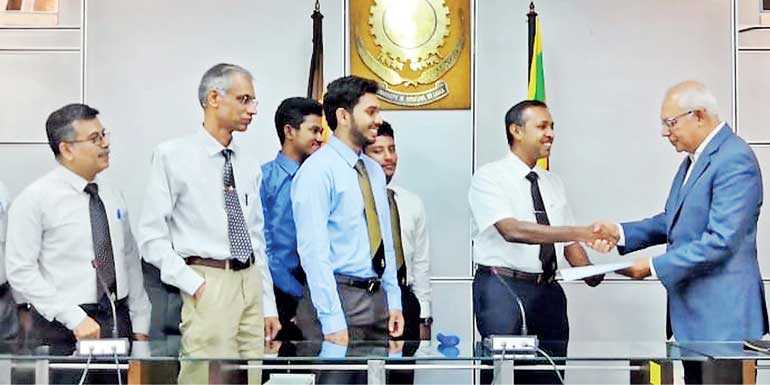Friday Feb 20, 2026
Friday Feb 20, 2026
Thursday, 15 August 2019 00:00 - - {{hitsCtrl.values.hits}}

Sri Lanka is in need of an active generation that is curious and ready to plunge into exploration. It is an activity that we have missed inculcating in our youngsters starting from a very young age. We are very much not ready to venture out, but ever so ready to wait welcoming those who venture out! Well, I am sure someone can say that is something you do not inculcate but encourage, as the young are always inquisitive and look at the world with a wide-eyed expression, always willing to explore and experience.  Why I say inculcate is when we see that expression, it is more likely that we do not encourage that, but quickly close the search with an answer, or work on an alternate path of expression. Mobiles, game boxes, and TVs have become excellent alternatives for explorations. We try to develop more the art of keeping children in a subdued mode, for the rest to continue doing whatever they want. We hear ‘No’ and ‘Don’t’ so much in our surroundings, and we fail to realise that these responses are directly suppressing a key attribute for growth. We buy the answers to their projects from bookshops, and later on, the grownups have not been sharpened on the skills of meeting challenges, and the negative consequences manifest. We do not understand how the process of education is amply benefitted by having an active curious population, rather than a population that await with the curiosity of only knowing what questions are coming – hints and all possible answers. The process of tuition has wreaked havoc in our system, and the sooner we realise the long-term ill effects of this parallel process, better it would be for all of us.
Why I say inculcate is when we see that expression, it is more likely that we do not encourage that, but quickly close the search with an answer, or work on an alternate path of expression. Mobiles, game boxes, and TVs have become excellent alternatives for explorations. We try to develop more the art of keeping children in a subdued mode, for the rest to continue doing whatever they want. We hear ‘No’ and ‘Don’t’ so much in our surroundings, and we fail to realise that these responses are directly suppressing a key attribute for growth. We buy the answers to their projects from bookshops, and later on, the grownups have not been sharpened on the skills of meeting challenges, and the negative consequences manifest. We do not understand how the process of education is amply benefitted by having an active curious population, rather than a population that await with the curiosity of only knowing what questions are coming – hints and all possible answers. The process of tuition has wreaked havoc in our system, and the sooner we realise the long-term ill effects of this parallel process, better it would be for all of us.
It was an extremely important gesture and support when MAS Holdings Co-founder and Chairman Deshamanya Dr. Mahesh Amalean gave a personal donation to both the Department of Chemical and Process Engineering of University of Moratuwa and the Chemical Engineering Student Society to realise two important objectives. This was a very personal commitment and gesture, and as such very much valued. He personally attended and handed over both awards to University of Moratuwa Vice Chancellor Prof Kapila Perera, in a simple ceremony held at the Senate Board Room of the university on 5 August. Faculty of Engineering Dean Prof Nalin Wickramarachchi, Chemical and Process Engineering (CPE) Department Head Prof Shantha Walpolage, and Chemical Engineering Student Society President Sineru Dinalankara were all present at this important occasion.
The first objective was the departmental objective of instituting an award for excellence in undergraduate research. The first donation went thus to establish the Deshamanya Mahesh Amalean Award for Undergraduate Research Excellence in Chemical and Process Engineering. The undergraduate research project is a recent addition to the CPE curriculum, with a view to promote research, and all students have this mandatory module to work through. At the end, there is also the undergraduate research symposium, showcasing the students’ findings, and performance at both these stages are taken into account for the final marks. Note that the research is not all doing, but communicating findings as well, and this event is open to anyone who is interested, as we usually take on practical industrial problems. The second donation was to institute a 24/7 student laboratory. I understand that Chemical and Process Engineering has quite an extensive system of laboratories at University of Moratuwa, and perhaps that is the degree program with the most number of labs under their belt. Then why another lab one may ask!
Where innovation is needed, we have instead a rigid set of rules and procedures, and the end result is limited advances. One may say some information technology-related advances have taken place. The issue is that the sector is not really challenged by these rules and procedures, and there is no need for custom procedures either! It is a pity that those who should know better, and those who have witnessed a lot outside, do not realise this and implement remedial measures to change these archaic procedures.
This lab would be different. It is a lab that will be managed by students, and should be available on a 24 hour on all 7 days basis – open and accessible to the research student. This actually breaks new grounds. As I remember, the first such lab happened with the interest of Mechanical Engineering students in their department sometime back. The outputs indicated the value of such an entity. CPE also initiated the process with limited resources. The freedom to operate and the responsibility that one takes in during the operations are all important experience points too. As we know, the public university system has serious resource utilisation constraints, due to the prevailing operating and procurement procedures. As we close labs around 3.30-4.00, the installed lights may never come on – quite an opposite of what one may observe in the west. Where innovation is needed, we have instead a rigid set of rules and procedures, and the end result is limited advances. One may say some information technology-related advances have taken place. The issue is that the sector is not really challenged by these rules and procedures, and there is no need for custom procedures either! It is a pity that those who should know better, and those who have witnessed a lot outside, do not realise this and implement remedial measures to change these archaic procedures. I yearn to see Schumpeter in action – the creative destruction imperative and his inputs were tried and tested in Germany way back in the 1920s. We need not be great innovators but simply follow a certain set of actions! However, I hope the Amalean initiative will bring some change. This 24/7 lab is not about simply computing, it is all about processes and products, and involves all types of physical, chemical, and biological operations. It should be noted that especially in the biological world, there is no understanding of the 8 hour working arrangements and extended weekends preferred by the human brethren. Hence if one wants to get some results, you must be sensitive to their behaviour, than expecting an evolutionary change by them to understand ours! Well this lack of understanding is not restricted to this country, as I myself found this at Cambridge when electrocuting food products on Saturdays and Sundays, though quite a while back. However, now I witness that the Department is Chemical Engineering and Biotechnology today, and I am sure has the 24/7 mentality across the board, and procedures to ensure that research is supported in whatever the area that one engages with.
We hear ‘No’ and ‘Don’t’ so much in our surroundings, and we fail to realise that these responses are directly suppressing a key attribute for growth. We buy the answers to their projects from bookshops, and later on, the grownups have not been sharpened on the skills of meeting challenges, and the negative consequences manifest. We do not understand how the process of education is amply benefitted by having an active curious population, rather than a population that await with the curiosity of only knowing what questions are coming – hints and all possible answers.
With the support extended by Dr Mahesh Amalean, the student society is expected to develop an experimentation facility to support their undergraduate project work. The Senate in approving this, understood what the donation is for, and as such there is the understanding at the decision-making level of what is intended. The students have to demonstrate not only responsibility, but accountability too. In his discussion, Dr. Amalean said he is keen to continue the dialogue with the department, and results shown from this exercise will go a long way in ensuring that his interest is kept alive. Well, it is to students’ advantage to perform, after all, Dr. Mahesh Amalean is a Chemical Engineer and today presides over Sri Lanka’s one of the most important Brands – MAS! He presides over South Asia’s largest manufacturer of intimate and sportswear, which provides design-to-delivery solutions. MAS, which is headquartered in Sri Lanka, has 53 manufacturing facilities located in 16 countries. A brand that is known for innovation, starting out initially with the implementation of lean management outside Japan, and now with SPRYNG, a smart athletic wear. He understands what being a pioneer means, and we want the students to think and act the same. Nothing ventured nothing gained, and there is no future for students who only want examination grades based on known questions, and research carried out on questions with the answer known well in advance.
Thank you Dr. Amalean for this very important donation, made personally and fulfilling two important objectives. The department and students will value the connection made with one of the most illustrious chemical engineers in Sri Lanka’s business ecosystem, and one who champions innovation. Systems grow with selfless commitments, and with people with open growth mind-sets. There is thus a lesson for many a business leader in Sri Lanka, as our nation requires innovation networks, and one important network is university business interaction, and we know that in today’s Sri Lanka, such networks perhaps still can be counted with the fingers in both your hands!